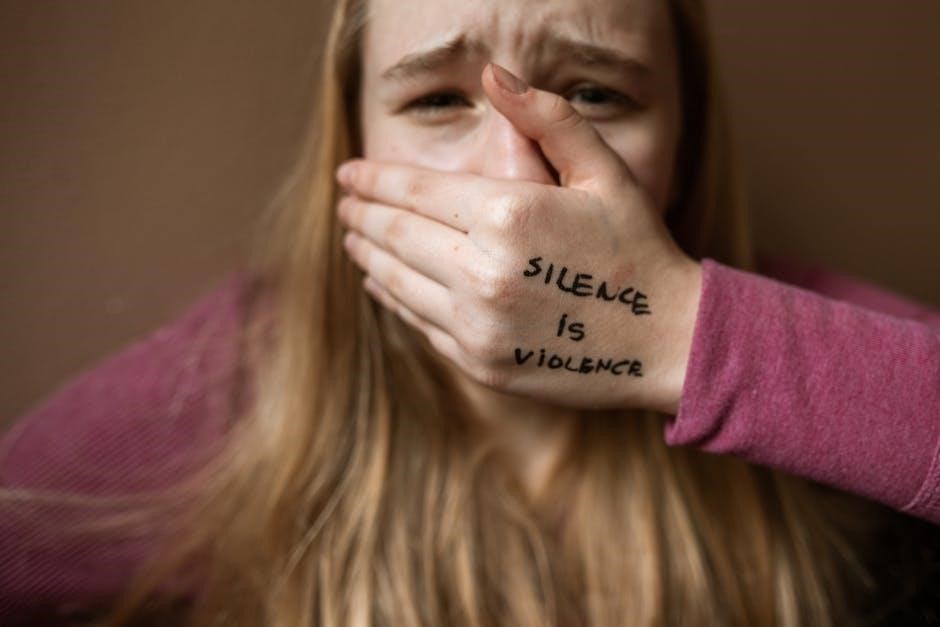Conflict theory, rooted in Karl Marx’s ideas, examines society as a system of inequality and power struggles․ It emphasizes class conflict arising from economic disparities, shaping social dynamics and change․
1․1 Definition and Overview
Conflict theory, rooted in Karl Marx’s ideas, defines society as a system of inequality and power struggles․ It posits that social structures are shaped by competing interests, primarily economic, leading to class conflict․ Marx argued that capitalism creates inherent tensions between the bourgeoisie (capitalists) and the proletariat (workers), driving social change․ Conflict theory critiques how power and resources are distributed, emphasizing the role of class struggle in shaping historical and contemporary societies․ This framework examines how inequality and power imbalances perpetuate social dynamics․
1․2 Historical Context
Conflict theory emerged during the 19th century, heavily influenced by the Industrial Revolution and its societal impacts․ Karl Marx witnessed widespread exploitation of workers, extreme poverty, and growing inequality, which shaped his analysis of class struggle․ The historical context of capitalist expansion and the rise of industrialization provided the backdrop for Marx’s critique of economic systems․ This period of social and political upheaval inspired Marx to develop his theories on class conflict, laying the foundation for conflict theory as a sociological framework․
1․3 Importance of Conflict Theory in Sociology
Conflict theory is pivotal in sociology as it provides a critical lens to analyze power dynamics and inequality․ By highlighting class struggles and economic disparities, it explains social change and the mechanisms of oppression․ This framework enables sociologists to understand how societal structures perpetuate inequality, offering insights into historical and contemporary issues like labor exploitation and wealth distribution․ Conflict theory remains essential for addressing systemic injustices and advocating for social reform, making it a cornerstone of sociological thought and activism․

Karl Marx and His Contributions
Karl Marx’s work laid the foundation for conflict theory, analyzing class relations and critiquing capitalism․ His ideas on class struggle and economic systems remain influential in sociology․
2․1 Biography of Karl Marx
Karl Marx, born on May 5, 1818, in Trier, Prussia, was a philosopher, economist, and sociologist․ He studied law and philosophy, developing an interest in radical ideas․ In Paris, he met Friedrich Engels, with whom he collaborated on The Communist Manifesto․ Marx observed the Industrial Revolution’s impact, leading him to critique capitalism and advocate for workers’ rights․ His theories on class struggle and historical materialism laid the groundwork for conflict theory․ Marx died on March 14, 1883, leaving a legacy that shaped modern sociology and political thought․
2․2 Development of Marx’s Conflict Theory
Karl Marx’s conflict theory emerged from his analysis of 19th-century industrial society․ Observing the exploitation of workers, Marx identified class struggle as the engine of social change․ He argued that capitalism creates inherent conflict between the bourgeoisie (capitalists) and the proletariat (workers)․ Marx contended that economic systems shape societal structures, leading to inequality and power imbalances․ His theory critiqued the capitalist system, emphasizing the eventual rise of class consciousness and the potential for revolutionary change to achieve a classless society․
2․3 Key Concepts in Marx’s Sociology
Karl Marx’s sociology centers on class struggle, with the bourgeoisie and proletariat as primary classes․ He introduced the concept of false consciousness, where the working class is unaware of its exploitation․ Marx also emphasized historical materialism, where economic systems determine societal structures․ His critique of capitalism highlights exploitation, surplus value, and alienation of labor․ These ideas form the foundation of his conflict theory, explaining social inequality and the potential for revolutionary change to achieve a classless society․

Core Concepts of Conflict Theory
Conflict theory focuses on class struggle, emphasizing the clash between the bourgeoisie and proletariat․ It highlights competition for resources, economic inequality, and power dynamics as central to societal conflict․
3․1 Class Struggle
Class struggle, a central concept in Marx’s conflict theory, describes the inherent tension between the bourgeoisie (capitalists) and the proletariat (workers)․ This struggle arises from the exploitation of the proletariat by the bourgeoisie, who control the means of production․ Marx argued that the proletariat’s labor generates surplus value, which the bourgeoisie appropriate as profit, leading to economic inequality and social unrest․ Class struggle is seen as the driving force behind historical and social change, ultimately shaping the trajectory of societies․
3․2 Bourgeoisie and Proletariat
The bourgeoisie and proletariat are central classes in Marx’s conflict theory․ The bourgeoisie, or capitalists, own the means of production, exploiting the proletariat, who must sell their labor for wages․ This economic relationship creates inherent conflict, as the bourgeoisie accumulate wealth while the proletariat remain alienated from their labor and its fruits․ Marx viewed the bourgeoisie as maintaining power through ideological and political mechanisms, perpetuating a system that sustains their dominance over the proletariat․
3․3 Economic Rewards and Resource Competition
Karl Marx argued that economic rewards and resource competition are central to class conflict․ Under capitalism, the bourgeoisie control the means of production, while the proletariat rely on selling their labor for survival․ This system fosters competition for limited resources, driving exploitation․ Marx believed that economic inequality arises from the bourgeoisie’s ability to extract surplus value from workers’ labor, perpetuating a cycle of class struggle and reinforcing power imbalances within society․

Class Consciousness and Solidarity
Class consciousness emerges as workers recognize shared interests and exploitation, fostering solidarity․ This unity enables collective action, challenging the bourgeoisie and driving social change․

4․1 Development of Class Consciousness
Class consciousness develops as workers recognize their shared economic and social conditions, fostering a collective identity․ Marx argued that workers transition from being a “class in itself” (objective exploitation) to a “class for itself” (organized resistance)․ Economic hardships, inequality, and exploitation catalyze this awareness, enabling workers to unite against the bourgeoisie․ Political organization and education further solidify class consciousness, transforming individual struggles into collective action aimed at challenging capitalist structures and achieving social change․
4․2 Role of Solidarity in Class Conflict
Solidarity is crucial in Marx’s conflict theory, as it unites workers against exploitation․ Shared experiences and collective action strengthen bonds among the proletariat, enabling them to challenge the bourgeoisie․ Solidarity fosters resilience, turning individual grievances into a powerful force for systemic change․ It is the foundation of class consciousness and the catalyst for revolution, empowering workers to overcome divisions and demand equitable social and economic conditions․
4․3 Political Organization and Revolution
Political organization is vital for revolution, as Marx emphasized․ The proletariat must form unions and parties to challenge capitalist structures․ Revolution arises when class consciousness peaks, leading to the overthrow of the bourgeoisie․ This collective action aims to establish a classless society, eliminating exploitation․ Marx viewed revolution as inevitable, driven by economic crises and worker solidarity, ultimately transitioning society from capitalism to socialism and communism, achieving true equality and justice․

Critique of Capitalism
Marx’s critique of capitalism highlights exploitation, inequality, and systemic instability․ He argues that capitalism creates class divisions, alienates workers, and perpetuates power imbalances, fostering social unrest․
5․1 Exploitation in Capitalist Systems
Marx argues that capitalism inherently exploits workers, as capitalists profit from laborers’ surplus value․ Workers are paid less than the value they produce, enriching the bourgeoisie while fostering alienation and inequality․ This systemic exploitation alienates workers from their labor, their humanity, and their potential․ Marx contends that capitalism’s reliance on wage labor creates a fundamental power imbalance, where the bourgeoisie thrive at the expense of the proletariat, perpetuating class divisions and social unrest․
5․2 Inequality and Power Imbalances
Marx identifies inequality and power imbalances as central to capitalist systems․ The bourgeoisie control resources and means of production, while the proletariat relies on selling labor for survival․ This division creates systemic inequality, with wealth concentrated among the elite, fostering a power imbalance that maintains class dominance․ Marx argues that ideology and institutions perpetuate these inequalities, ensuring the ruling class maintains control and the working class remains subjugated, reinforcing the cycle of exploitation and social stratification․
5․3 Historical Development of Capitalist Conflict
Marx traces capitalist conflict to the rise of industrialization and the shift from feudalism to capitalism․ The exploitation of labor during the Industrial Revolution intensified class struggle, as workers moved from agrarian societies to urban centers․ Historical events, such as the enclosure movement and factory system emergence, deepened economic disparities․ Marx argues that these developments solidified the bourgeoisie’s power, creating a system where profit over people drives persistent conflict, shaping modern capitalist societies’ inherent inequalities and power dynamics․

Contemporary Relevance of Conflict Theory
Conflict theory remains vital in analyzing modern capitalist societies, addressing issues like economic inequality, class struggle, and systemic injustices, highlighting Marx’s enduring relevance in understanding power dynamics today․
6․1 Modern Applications of Marx’s Ideas
Marx’s ideas remain highly relevant in analyzing contemporary issues like economic inequality, labor rights, and globalization․ His concept of class struggle applies to modern capitalism, where the wealth gap between the bourgeoisie and proletariat persists․ The rise of automation and gig economies highlights Marx’s warnings about exploitation and alienation․ Additionally, Marx’s critique of power structures informs discussions on systemic racism, gender inequality, and environmental degradation․ His theories inspire social movements and policy debates, demonstrating their enduring influence in understanding and addressing societal conflicts today․
6․2 Economic Inequality and Class Struggle Today
Karl Marx’s concepts of class struggle and economic inequality remain starkly relevant in modern society․ The widening wealth gap between the bourgeoisie and proletariat is evident, with the richest 1% holding disproportionate wealth․ Exploitation persists through low wages, precarious jobs, and the gig economy, mirroring Marx’s critique of capitalist exploitation․ Systemic inequalities, such as unfair tax policies and limited access to resources, perpetuate class divisions․ These disparities fuel ongoing protests and debates about economic justice, aligning with Marx’s framework of inherent conflict within capitalist systems․
6․3 Conflict Theory in Global Contexts

Karl Marx’s conflict theory extends beyond capitalist societies, offering insights into global power dynamics․ In developing nations, class struggles manifest as resistance to colonial legacies and neoliberal policies․ Globalization exacerbates inequality, with multinational corporations exploiting resources and labor in the Global South․ Marx’s framework highlights how transnational capital perpetuates disparities, fueling protests and social movements worldwide․ His ideas resonate in critiques of imperialism and advocacy for global justice, demonstrating the universal relevance of conflict theory in understanding economic and political inequalities across borders․

Karl Marx’s conflict theory remains influential, addressing inequality and inspiring movements․ Its relevance in modern societies underscores the ongoing struggle for justice and equity globally․
7․1 Summary of Key Points
Karl Marx’s conflict theory posits that society is shaped by class struggle between the bourgeoisie and proletariat․ Economic systems, particularly capitalism, create inequality and exploitation, driving social change․ Marx argued that class consciousness and solidarity among workers could lead to revolution, challenging oppressive systems․ His ideas remain relevant today, addressing systemic inequality and inspiring movements for justice and equity․ The theory emphasizes the role of power dynamics and resource competition in shaping social structures and conflict․
7․2 Legacy of Karl Marx’s Conflict Theory
Karl Marx’s conflict theory has had a profound and lasting impact on sociology, politics, and economics․ His ideas on class struggle and the critique of capitalism influenced revolutions and shaped modern social movements․ Marx’s work laid the foundation for critical theories, inspiring scholars and activists to address inequality and power imbalances․ His legacy endures in contemporary debates on labor rights, economic justice, and global inequality, ensuring his theories remain a vital tool for understanding and challenging societal structures․
7․3 Future Directions for Conflict Theory
Conflict theory continues to evolve, addressing contemporary issues like globalization, digital divides, and intersectional inequalities․ Future research may focus on how power dynamics shift in a post-capitalist world and the role of technology in amplifying or mitigating class struggles․ By integrating diverse perspectives, conflict theory can remain a robust framework for analyzing social change and advocating for equity in an increasingly complex global landscape․